Terry Rosell Retires from the Center for Practical Bioethics
Reflections on a Life and a Vocation
By Trudi Galblum
Marketing, Communications and Grant Writing
 Tarris (Terry) Rosell, son of DeWayne and Donna Mae Rosell, was raised with four siblings on a farm in west central Minnesota. The population of the closest town was 22. The culture was strongly religious and conservative. Terry was three years old when he stood on a chair in the fellowship hall of Rose City Evangelical Free Church announcing that he wanted to be a pastor when he grew up.
Tarris (Terry) Rosell, son of DeWayne and Donna Mae Rosell, was raised with four siblings on a farm in west central Minnesota. The population of the closest town was 22. The culture was strongly religious and conservative. Terry was three years old when he stood on a chair in the fellowship hall of Rose City Evangelical Free Church announcing that he wanted to be a pastor when he grew up.
“At some level,” he said, “I knew that’s what my father aspired to be and couldn’t, so that’s what I was going to be.”
Bioethics was not part of the plan. Bioethics entered the picture much later and serendipitously, like many who have entered the profession since it fully emerged in the 1960s and 70s.
Terry graduated from Bethel College in St. Paul, Minnesota, in 1979 with a Bachelor of Arts in Biblical and Theological Studies. There he met and married Ruth Lofgren, who was training to be a nurse. For their honeymoon, they drove to South Hamilton, Massachusetts, to both attend Gordon-Conwell Theological Seminary.
After ordination as American Baptist ministers in 1983, Terry and Ruth co-pastored churches in Upstate New York, during which time Terry earned his Doctor of Ministry degree from Colgate Rochester Divinity School. Terry and Ruth hoped to serve together as international missionaries, but with church funds to send them abroad short during a recession, they applied to serve as “home missionaries.” From 1988 to 1994 in Kansas City, they resettled refugees and cofounded and co-pastored the Lao American Baptist Church in Lenexa, Kansas.
The Vanderbilt Years
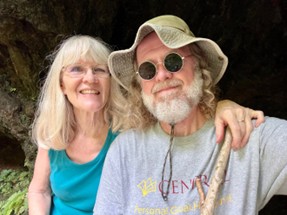
In 1994, the Rosells left Kansas City with their four children ages 2, 4, 7 and 9 to work on doctoral degrees at Vanderbilt University in Nashville. Ruth, whose ministry ultimately focused on pastoral care and counseling, trained to be a counselor while working fulltime as a psychiatric nurse. Terry studied Ethics and Society.
One day a fellow student invited him to attend a seminar at Vanderbilt’s Center for Clinical and Research Ethics run by a noted phenomenological philosopher, Dr Richard Zaner.
“I didn’t always know what Zaner and colleagues were talking about, but I kept coming back. So after a year or so, they asked if I was interested in an internship in clinical ethics,” said Terry. “This involved rounding in the ICUs two or three mornings a week. After doing that for two years, they invited me to apply for a two-year organ transplant ethics fellowship.”
Thus over five years in the Vanderbilt Medical Center, Terry learned a lot about medicine and clinical ethics in the real world. His doctoral research focused on clinical ethics as related especially to responsibility ethics and living donor organ donation/transplantation. In subsequent years, Terry would address in research and writing additional issues such as medical futility, clergy/chaplain discernment in biomedical crises, thanatology, end-of-life care, advance care planning, health and health disparities, and ethics of nonviolence.
Return to KC
We have Central Baptist Theological Seminary to thank for bringing the Rosells back to Kansas City to teach in 1999, where Terry continues to serve as Professor of Pastoral Theology. And we have Robert Potter, MD, PhD, who retired from the Center in 2004, to thank for bringing Terry to the Center.
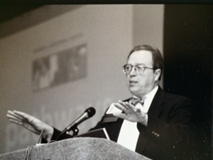
“I knew who Robert was because he had lectured at my church before we left for Vanderbilt,” said Terry. “Robert didn’t know me, but he did know that I was coming to Kansas City to take the seminary position vacated by one of his best friends. Professor Neil Denton had recently died of kidney failure. On my first day in the office at Central Seminary, Robert showed up and took me to meet people at the Center.”
One thing led to another.
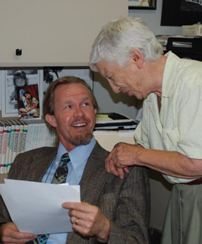
Robert invited Terry to join the Center’s Ethics Committee Consortium. As a volunteer, Terry presented Caring Conversations® workshops that put tools in the hands of patients and loved ones to make their end-of-life wishes known. With another clergyperson, Terry co-chaired the Center’s Compassion Sabbath Task Force. That program trained hundreds of faith leaders to better address the needs of seriously ill and dying congregants and their families.
When Dr. Potter retired from the Center in early 2004, Terry joined the Center’s staff as a program associate under a unique arrangement that allowed him concurrently to job share his faculty position at Central Seminary with Ruth. In 2009, he was appointed as the first Rosemary Flanigan Chair in Bioethics.
For the Good
For the next 20 years, the Center provided fertile ground for Terry to merge his spiritual, philosophical and bioethics background and training.
“At the Center, I have been given opportunity after opportunity after opportunity to make a difference in people’s lives. Mostly,” he humbly adds, “for the good.”
- MetroCARE – Terry served as project director for the Center’s Medical Outreach Project/Specialty Healthcare Referral Network initiative for underserved populations, which evolved in 2007 as MetroCARE administered by the Kansas City Medical Society.
- Sabbaths of Hope – Collaborating with Mental Health America of the Heartland, Terry co-directed this initiative to address stigma of depression in faith communities and remove barriers of access to treatment.
- Blood and Marrow Transplant (BMT) Programs – Terry provided clinical ethics consultation for the Saint Luke’s Cancer Institute and subsequently also with the BMT team at the University of Kansas Hospital.
- Schwartz Rounds – Terry initiated and facilitated Schwartz Rounds for nearly 10 years at Saint Luke’s. This was a series of structured discussions where healthcare staff can reflect on the emotional and social aspects of their work. A similar format was introduced subsequently at several area hospices.
- St. John Health/Duke University Collaboration for Palliative Care – Using the Compassion Sabbath model along with Caring Conversations®, Terry provided leadership for a multi-year project to engage faith communities in Greater Detroit. Ultimately hundreds of clergy were engaged and trained in Advance Care Planning and end-of-life issues.
Terry consulted on other short-term projects: with the New Jersey Funeral Directors Association in regard to organ donation; for a hospital in North Carolina on a complex case involving difficulty discharging a patient hospitalized for five years; doing an ethics review during the COVID-19 pandemic for a hospital in the Pacific Northwest that was being investigated for alleged discrimination against a ventilated patient with developmental disabilities.
Teaching Legacy
Of the many ways Terry has impacted bioethics, it’s fair to say that his teaching – whether in classrooms, boardrooms or at bedsides – has saved, changed and influenced the most lives.
One of Terry’s first assignments upon joining the Center in 2004 was to lecture on bioethics with Dr. Flanigan at Kansas City University (KCU) of Medicine and Biosciences. In 2007, when KCU was about to launch its new Master’s in Bioethics degree, Terry joined the bioethics faculty as an adjunct professor. By
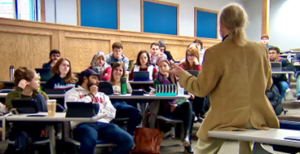
contract with the Center, Terry served as Interim Chair of KCU’s Department of Bioethics starting in 2013 and held the post as Chair until January 2020 when he persuaded the Dean to replace him with a full-time Chair.
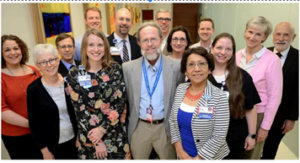
Terry was already consulting with the BMT Team at the University of Kansas Hospital in 2009 when Christopher Crenner, MD, PhD, Professor of History and Philosophy of Medicine, invited him to join the faculty as a Clinical Associate Professor of Ethics in the University of Kansas Medical Center (KUMC) School of Medicine. This would involve teaching and also leadership of clinical ethics for KU Hospital. Terry agreed to do so only if they contracted with the Center for part of his time, which is what happened.
At KUMC, Terry was promoted to full professor in 2016. In the Department of History and Philosophy, he has co-directed the Clendening Summer Fellowship and research electives for medical students. He serves as faculty mentor and principal investigator for student research projects, provides ethics education for physician residency and fellowship programs, co-chairs the Hospital Ethics Committee, and directs the University of Kansas Health System’s Ethics Consultation Service. This has meant almost 24/7 on-call availability for the past 15+ years so as to respond to requests for ethics consultation.
Since 2009, ethics consultations at the hospital have increased from 16 to 20 a year to more than 220 per year.
The Faith Factor
It’s probably no coincidence that many teachers and practitioners of healthcare ethics have backgrounds in theology and pastoral care. At the Center, Rosemary Flanigan, CSJ, PhD, who served as a Board President and later a program associate – and in whose name the Flanigan Chair Terry holds is endowed – is a Sister of St. Joseph of Carondelet. Dr. Robert Potter studied theology and ethics at the University of Chicago.
Medical ethics has deep roots in both theological and philosophical traditions. Clergy are typically trained in ethics, moral reasoning, and navigating decisions that involve beliefs and values.
“I’m very clear about differentiating my clergy role and background from my clinical ethics consultant role,” said Terry. “But the skills, empathy, compassion, conflict management and mediation I learned from my pastoral care and counseling training is very helpful.”
Also helpful, he says, is the hope he draws from his faith tradition’s belief in redemption.
“I go into situations where clinicians, patients and/or family members are frustrated and sometimes misbehaving,” he said. “If I sit down and listen, I oftentimes come to realize that this is just another human in a bad situation whose best self isn’t coming out. But there is hope – hope for better behavior on their part and on ours also. Functioning as our better selves leads to better outcomes for patients and everyone.”
So Much Else to Do
Terry’s positivity carries over to his plans for retirement.
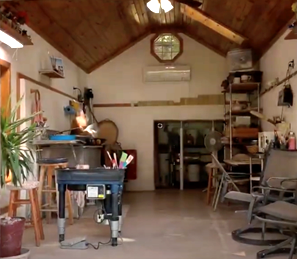
“I will miss good colleagues and the opportunities that come because of one’s role and place,” he said. “But I won’t miss being on-call and having to do all the work that vocational opportunities bring. There’s so much else in life to explore for the remaining time that I have.”
Terry ticks off a list.
Traveling with Ruth to as many national and state parks as possible.
Composing and performing music for lyrics already or yet to be written.
Writing children’s books that his artist daughter, Hannah, will illustrate and completing a book of essays tentatively titled, “Life Lessons Learned at a Potter’s Wheel.”
Creating ceramics for donations, 100% of which support international humanitarian projects through the nonprofit organization he began with an Ethiopian seminary student several years ago, LivingLove International.
Caring for his grandchildren, Luca and Genevieve.
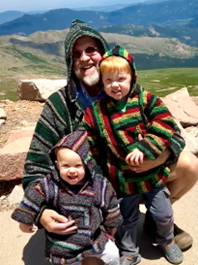
In retirement, Terry looks forward to more time for activities of this sort and spending time at home in his studio on the shores of Lake Dabinawa, about 12 miles north of the University of Kansas.
From the lyrics of a song just written:
Decades pass,
And then they’re gone.
Count the days,
Each one a blessing.
Life is short,
Despite how long
It is.
Life is short.
Live each day well.
Story Written By Trudi Galblum


